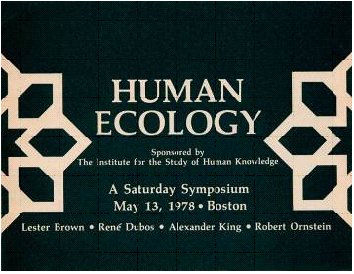Mind Body Seminar: May 1978
HUMAN ECOLOGY
Sponsored by
The Institute for the Study of Human Knowledge
Saturday, May 13,1978
Boston

Increasingly in recent years, the media have reported the incidence of new environmental “crises”—explosive population growth, pollution, over consumption of energy, depletion or resources, and the multiple impact of inappropriate technological intervention. Yet, few social critics and even fewer citizens realize that problems which we have come to consider “environmental” are problems of human choice, action, and understanding. Overcrowding, polluted waters, urban smog, gas shortages, are created anew each day by our own decisions. As such, they represent problems of human, not technological, dimensions.
Many contemporary thinkers have noted that the global crisis in our environment has common roots with current problems in medicine, psychology, and education. One source of the difficulty is that we are trained largely for analysis, to divide whole systems in order to study the parts. In so doing, we have failed to develop the ability to perceive the whole dimensions of the problems facing humanity and to assess properly the consequences of our actions.
What is most needed, therefore, is not a set of programs or even new technological solutions, but a new understanding of our actions and their effects. This ability to perceive comprehensively can be learned and developed through psychological methods which are known in Eastern and Western worlds.
This symposium will explore the relevance of educating human understanding for the creation of sound social policy. The program brings together leading experts on technology, global issues, and human ecology.
THE FACULTY
LESTER R. BROWN is founder and President of Worldwatch Institute, an independent, non-profit research organization created to identify and to focus attention on global problems. He has been a Senior Fellow at the Overseas Development Council and Administrator of the International Agricultural Development Service of the United States Department of Agriculture. He is the author of SEEDS OF CHANGE, WORLD WITHOUT BORDERS, IN THE HUMAN INTEREST, BY BREAD ALONE, and the recent THE TWENTY-NINTH DAY.
RENE DUBOS, Ph.D., is Professor Emeritus of Environmental Biomedicine at the Rockefeller University. His early research involved the development of anti-microbial drugs and more recently he has been investigating the effects that environmental forces-physiochemical, biological, and social-exert on human life. Dr. Dubos is author of over twenty books including THE MIRAGE OF HEALTH, MAN ADAPTING, SO HUMAN AN ANIMAL, and BEAST OR ANGEL: CHOICES THAT MAKE US HUMAN.
ALEXANDER KING is one of the founders of the Club of Rome, and is Director of the Nobel Foundation’s International Federation of Institutes of Advanced Study. He is active in speaking and lecturing about the issues of human ecology and development throughout the world.
ROBERT E. ORNSTEIN, Ph.D., is Director of HUMAN NATURE magazine, Associate Professor of Medical Psychology, Langley Porter Institute, University of California, San Francisco, and the President of The Institute for the Study of Human Knowledge. He has done research on the relation of hemispheric specialization to consciousness, biofeedback of EEG asymmetry, and the experience of time. He is the editor of THE NATURE OF HUMAN CONSCIOUSNESS, author of THE PSYCHOLOGY OF CONSCIOUSNESS and THE MIND FIELD, and co-author of ON THE PSYCHOLOGY OF MEDITATION.
THE PROGRAM
9:00-9:30
INTRODUCTORY REMARKS: Alexander King
9:30-10:30
THE DIMENSIONS OF THE POPULATION PROBLEM: Lester R. Brown
How can we accommodate increasing numbers to the earth’s
resources?
10:30-10:45
QUESTIONS AND ANSWERS: Lester R. Brown
11:00-12:00
A REPORT ON THE STATE OF THE PLANET: Alexander King
Many ecological problems appear disconnected. In fact, the questions of population, resource allocation, economic growth, and pollution are intimately related. A complete look at developments on the planet must be attempted.
12:00-12:30
QUESTIONS AND ANSWERS: Alexander King
1:45-2:45
HUMAN ECOLOGY AND HUMAN UNDERSTANDING: Robert Ornstein
Recent research has indicated that human capacities for understanding are not limited to the analytic mode. In most people, half of the brain is specialized to link elements together. The relevance of the development of these two modes to our current situation will be discussed.
2:45-3:15
QUESTIONS AND ANSWERS: Robert Ornstein
3:30-4:30
SYMBIOSIS OF EARTH AND HUMANKIND: Rene Dubos
Although much of the subject matter of this program concerns itself with the already serious despoliation of the earth’s resources, clearly not all human incursions into the environment are destructive. In many instances, the “natural” environment has been modified to produce mutual advantages for both man and nature. This lecture will point out and discuss examples of such symbiotic relationships.
4:30-5:00
QUESTIONS AND ANSWERS: Rene Dubos
